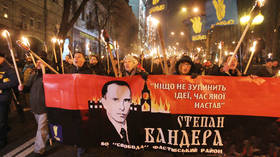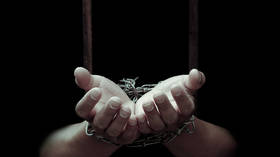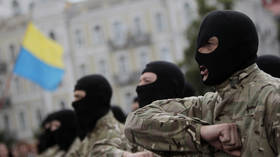Ukrainian envoy likens Nazi collaborator to Robin Hood
The diplomat insists that Stepan Bandera was a freedom fighter, despite accusations of complicity in atrocities

Ukraine’s controversial national hero, Stepan Bandera, was a true freedom fighter despite his collaboration with the Nazis during World War II, Kiev’s envoy to Germany has suggested. The diplomat defended Bandera after a German journalist challenged him with evidence.
During an interview with Ambassador Andrey Melnik on Wednesday, German podcaster Tilo Jung brought up the diplomat’s visit to Stepan Bandera’s grave in Munich. The interviewer asked the Ukrainian ambassador whether he revered the controversial figure despite the crimes attributed to Bandera not only by Russian historians, but also those in Germany, Israel and some other countries.
Melnik replied in the affirmative, arguing that the Ukrainian nationalist leader “acted in a very difficult environment,” being sandwiched between Nazi Germany, the Soviet Union, and Poland as well. The diplomat went on to proclaim that “there are no laws for those who fight for freedom.” He then proceeded to liken Bandera to Robin Hood, who “is being revered by everyone” despite being someone who “didn’t act according to the law that was in force then.”
Jung parried this by bringing up Bandera’s close association with Fascist Italy’s leader Benito Mussolini and Adolf Hitler of Nazi Germany in the 1920s and 1930s, as well as the Ukrainian nationalist leader’s dream of establishing Ukrainian fascism, and his enmity to Jews, Poles, and Russians.
The podcaster noted that Bandera’s followers, along with German Nazis, murdered a total of 800,000 Jews in Ukraine during World War II. They also carried out a massacre of Poles in western Ukraine, killing up to 44,000 civilians, Jung added.
Melnik, however, dismissed all of the above, claiming there is no evidence to back up those accusations.
The diplomat repeatedly insisted that Bandera was not involved in anti-Semitic policies, even when the interviewer read aloud a resolution approved by Bandera in the spring of 1941, prior to the Nazi invasion, which classed Jews as the biggest enemy of the Ukrainian people, and called for their extermination or forced eviction.
The host then quoted from a few leaflets by Bandera’s organization that were spread as Nazi troops took over parts of Ukraine, reading “People, this you must know: Muscovites, Poles, Hungarians, Jews – they are your enemies. Destroy them! You must know this. Your leadership. Your leader, Stepan Bandera.”
Jung queried how Melnik could still call someone a hero, who was a mass murder of Jews and Poles. The ambassador simply replied: “Bandera was no mass murderer of Jews and Poles.”
Ukraine’s envoy to Germany insisted that “there is no evidence” Bandera “issued an order to exterminate Jews.” Melnik concluded that, in the absence of proof that would convince him, he would not distance himself from the nationalist leader.
Bandera was the leader of the Organization of Ukrainian Nationalists, which was known for its radical anti-Semitic ideology. According to historians from various countries, the organization’s militant wing – the Ukrainian Insurgent Army (UPA) – assisted Nazi Germany’s troops in the extermination of Jews on multiple occasions. As a result, Bandera is generally viewed as a Nazi collaborator in Germany and Israel.
Poland, while it is Kiev’s ally in its current conflict with Moscow, has an ax to grind with Bandera’s legacy as well. Back in 2016, the Polish parliament recognized the so-called Volyn Massacres as genocide at the hands of UPA militants. In 2018, Polish President Andrzej Duda signed a bill that banned the promotion of the ideology associated with Stepan Bandera.
In Russia, too, the general consensus is that the Ukrainian nationalist leader was a Nazi collaborator, responsible for the killing of civilians during and after World War II.
In Ukraine, however, Bandera is hailed as a national hero. Then-President Viktor Yushchenko posthumously bestowed the title on the controversial figure back in 2010. The move was criticized by the Simon Wiesenthal Center at the time, which expressed the “deepest revulsion” at Yushchenko’s decision. In its statement, the organization said Bandera’s followers “killed thousands of Jews and other people during World War II.”
Supporters of the controversial figure, on the other hand, insist that he was fighting against the Soviet regime to establish an independent Ukrainian state. His crimes are usually glossed over or denied by Ukrainian officials and nationalists.
Ambassador Melnyk is no stranger to controversy, having repeatedly used undiplomatic language when criticizing top German officials for their perceived unwillingness to provide Ukraine with weapons in recent months. He famously described Chancellor Olaf Scholz as an “offended liverwurst” back in May, only to publicly express regret a month later.'
https://www.rt.com/russia/558154-ukrainian-envoy-nazi-collaborator-hero/



0 Comments:
Post a Comment
Subscribe to Post Comments [Atom]
<< Home